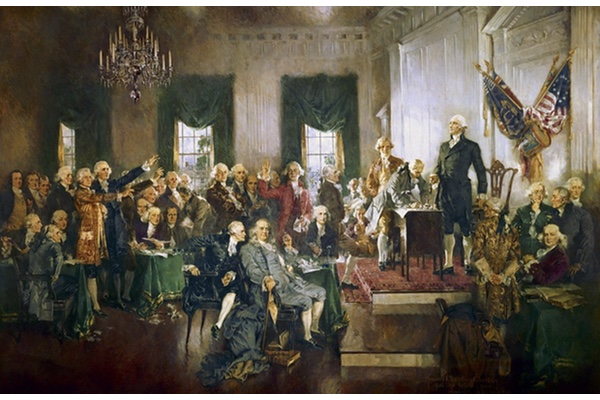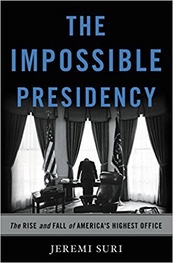Trump Is Everything the Founding Fathers Feared in a President

The U.S. presidency is the most powerful office in the world, but it is set up to fail. And the power is the problem. Beginning as a small and uncertain position within a large and sprawling democracy, the presidency has grown over two centuries into a towering central command for global decisions about war, economy, and justice. The president can bomb more places, spend more money, and influence more people than any other figure in history. His reach is almost boundless.
 Reach
does not promote desired results. Each major president has changed
the world, but none has changed it as he liked. Often just the
opposite. Rising power elicits demands on that power, at home and
abroad, that exceed capabilities. Rising power also inspires
resistance, from jealous friends as much as determined adversaries.
Dominance motivates mounting commitments, exaggerated promises, and
widening distractions – “mission creep,” in its many infectious
forms.
Reach
does not promote desired results. Each major president has changed
the world, but none has changed it as he liked. Often just the
opposite. Rising power elicits demands on that power, at home and
abroad, that exceed capabilities. Rising power also inspires
resistance, from jealous friends as much as determined adversaries.
Dominance motivates mounting commitments, exaggerated promises, and
widening distractions – “mission creep,” in its many infectious
forms.
Despite their dominance, modern presidents have rarely achieved what they wanted because they have consistently overcommitted, over-promised, and overreached. They have run in too many directions at once. They have tried to achieve success too fast. They have departed from their priorities. And they have become too preoccupied with managing crises, rather than leading the country in desired directions.
Extraordinary power has pushed even the most ambitious presidents to become largely reactive – racing to put out the latest fire, rather than focusing on the most important goals. The crises caused by small and distant actors have frequently defined the presidents. The time and resources spent on crises have diminished the attention to matters with much greater significance for the nation as a whole. Presidents frequently lose control of their agendas because they are too busy deploying their power flagrantly, rather than targeting it selectively.
Unmatched capabilities and ambitions encourage undisciplined decision-making, followed by stubborn efforts to make good on poor choices. These are the “sunk costs” that hang over the heads of powerful leaders determined to make sure nothing sinks, except their own presidencies. As much as they try, presidents cannot redeem the past nor control the present. Their most effective use of power is investing in future changes defined around a limited set of national economic, social, and military priorities. Priorities matter most for successful leaders, but presidents forget them in the ever-denser fog of White House decision-making.
Thomas Jefferson anticipated these circumstances two centuries ago. Although he valued virtue and strength in leaders, Jefferson recognized that these qualities were potential sources of despotism as much as democracy. The virtuous and the strong often try to do too much, and they adopt tyrannical practices in pursuit of worthy, now corrupted, purposes. Machiavelli’s prince, who promotes the public good through ruthless policies, was a warning against centralized power run amok.
Like other founders steeped in the history of empires, Jefferson wanted to insure that the United States remained a republic with restrained, modest, and cautious leaders. He envisioned a president who embodied wisdom above all – a philosopher president more than a warrior president or a businessman president. For Jefferson, the essential qualities of leadership came from the intellect of the man who occupied the office.
The checks and balances in the U.S. Constitution divided power to prevent presidential tyranny, but they did not guarantee the necessary intellect, prudence, or personal restraint of the people in charge. Fragmented authority could be just as flagrant and misguided as centralized authority, and it could franchise its despotism in multiplying offices and agencies with similar effects to the dictatorial prince. A powerful democracy ultimately relied upon the wisdom and self-denial of its leaders, not constitutional barriers, according to Jefferson. Democratic leaders had to remain introspective and ascetic as their country grew more dynamic and prosperous.
Writing on the eve of the country’s first burst of expansion, Jefferson warned that the nation’s leaders may one day “shake a rod over the heads of all, which may make the stoutest of them tremble.” Restrained use of power and disciplined focus on the national interest were the only antidotes to excess, despotism, and decline. “I hope our wisdom will grow with our power,” Jefferson wrote, “and teach us that the less we use our power the greater it will be.”
Jefferson’s heirs did not heed his words. By the mid-twentieth century the rapid growth of American power made frequent misuse unavoidable, and effective leadership nearly unattainable. The United States strayed from its values more than any elected president could correct, despite repeated public hopes for a savior. Leaders pursued goals – for wealth, influence, and security – that undermined the democracy they aimed to preserve.
The widening gap between power and values produced President Donald Trump, elected to promote raw power above all. He is the final fall of the founders’ presidency – the absolute antithesis of what they expected for the office. President Trump was not inevitable, but the rise and fall of America’s highest office had a historical logic that explains the current moment, and how we might move forward.